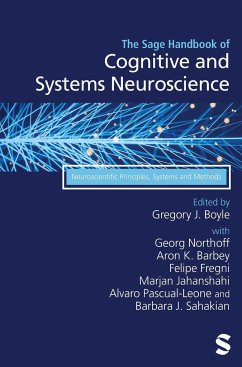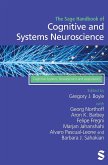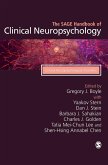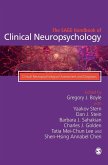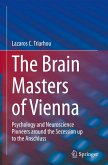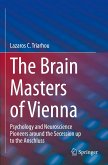The Sage Handbook of Cognitive and Systems Neuroscience
Herausgegeben:Boyle, Gregory J.; Northoff, Georg; Barbey, Aron K.; Fregni, Felipe; Jahanshahi, Marjan; Pascual-Leone, Alvaro; Sahakian, Barbara J.
The Sage Handbook of Cognitive and Systems Neuroscience
Herausgegeben:Boyle, Gregory J.; Northoff, Georg; Barbey, Aron K.; Fregni, Felipe; Jahanshahi, Marjan; Pascual-Leone, Alvaro; Sahakian, Barbara J.
- Gebundenes Buch
- Merkliste
- Auf die Merkliste
- Bewerten Bewerten
- Teilen
- Produkt teilen
- Produkterinnerung
- Produkterinnerung
Cognitive neuroscience is the interdisciplinary study of how cognitive and intellectual functions are processed and represented within the brain, which is critical to building understanding of core psychological and behavioural processes such as learning, memory, behaviour, perception, and consciousness. Understanding these processes not only offers relevant fundamental insights into brain-behavioural relations, but may also lead to actionable knowledge that can be applied in the clinical treatment of patients with various brain-related disabilities.
This Handbook focusses on the…mehr
Andere Kunden interessierten sich auch für
![The Sage Handbook of Cognitive and Systems Neuroscience The Sage Handbook of Cognitive and Systems Neuroscience]() The Sage Handbook of Cognitive and Systems Neuroscience118,99 €
The Sage Handbook of Cognitive and Systems Neuroscience118,99 €![The SAGE Handbook of Clinical Neuropsychology The SAGE Handbook of Clinical Neuropsychology]() The SAGE Handbook of Clinical Neuropsychology118,99 €
The SAGE Handbook of Clinical Neuropsychology118,99 €![The SAGE Handbook of Clinical Neuropsychology The SAGE Handbook of Clinical Neuropsychology]() The SAGE Handbook of Clinical Neuropsychology118,99 €
The SAGE Handbook of Clinical Neuropsychology118,99 €![The Brain Masters of Vienna The Brain Masters of Vienna]() Lazaros C. TriarhouThe Brain Masters of Vienna75,99 €
Lazaros C. TriarhouThe Brain Masters of Vienna75,99 €![The Brain Masters of Vienna The Brain Masters of Vienna]() Lazaros C. TriarhouThe Brain Masters of Vienna75,99 €
Lazaros C. TriarhouThe Brain Masters of Vienna75,99 €![The SAGE Handbook of Evolutionary Psychology The SAGE Handbook of Evolutionary Psychology]() The SAGE Handbook of Evolutionary Psychology131,99 €
The SAGE Handbook of Evolutionary Psychology131,99 €![The SAGE Handbook of Identities The SAGE Handbook of Identities]() The SAGE Handbook of Identities131,99 €
The SAGE Handbook of Identities131,99 €-
-
-
Cognitive neuroscience is the interdisciplinary study of how cognitive and intellectual functions are processed and represented within the brain, which is critical to building understanding of core psychological and behavioural processes such as learning, memory, behaviour, perception, and consciousness. Understanding these processes not only offers relevant fundamental insights into brain-behavioural relations, but may also lead to actionable knowledge that can be applied in the clinical treatment of patients with various brain-related disabilities.
This Handbook focusses on the foundational principles, methods, and underlying systems in cognitive and systems neuroscience, as well as examining cutting-edge methodological advances and innovations.
Containing 34 original, state of the art contributions from leading experts in the field, this Handbook is essential reading for researchers and students of cognitive psychology, as well as scholars across the fields of neuroscientific, behavioural and health sciences.
Part 1: Background Considerations
Part 2: Neuroscientific Substrates and Principles
Part 3: Neuroanatomical Brain Systems
Part 4: Neural Dynamics and Processes
Part 5: Sensory-Perceptual Systems and Cognition
Part 6: Methodological Advances
This Handbook focusses on the foundational principles, methods, and underlying systems in cognitive and systems neuroscience, as well as examining cutting-edge methodological advances and innovations.
Containing 34 original, state of the art contributions from leading experts in the field, this Handbook is essential reading for researchers and students of cognitive psychology, as well as scholars across the fields of neuroscientific, behavioural and health sciences.
Part 1: Background Considerations
Part 2: Neuroscientific Substrates and Principles
Part 3: Neuroanatomical Brain Systems
Part 4: Neural Dynamics and Processes
Part 5: Sensory-Perceptual Systems and Cognition
Part 6: Methodological Advances
Produktdetails
- Produktdetails
- Verlag: SAGE Publications Ltd / Sage Publications
- Seitenzahl: 632
- Erscheinungstermin: 3. November 2023
- Englisch
- Abmessung: 250mm x 175mm x 38mm
- Gewicht: 1228g
- ISBN-13: 9781529753554
- ISBN-10: 1529753554
- Artikelnr.: 68285002
- Herstellerkennzeichnung
- Libri GmbH
- Europaallee 1
- 36244 Bad Hersfeld
- gpsr@libri.de
- Verlag: SAGE Publications Ltd / Sage Publications
- Seitenzahl: 632
- Erscheinungstermin: 3. November 2023
- Englisch
- Abmessung: 250mm x 175mm x 38mm
- Gewicht: 1228g
- ISBN-13: 9781529753554
- ISBN-10: 1529753554
- Artikelnr.: 68285002
- Herstellerkennzeichnung
- Libri GmbH
- Europaallee 1
- 36244 Bad Hersfeld
- gpsr@libri.de
Editor-in-Chief Gregory J. Boyle is an Hon Professorial Fellow at the University of Melbourne. He earned separate PhDs from both the University of Delaware, and the University of Melbourne. Also, he earned a DSc from the University of Queensland, for his sustained contributions to psychological science. He is a Fellow of both the Association for Psychological Science, and the Australian Psychological Society, and recipient of the Buros Institute of Mental Measurements Distinguished Reviewer Award. Editors Aron K. Barbey is Professor of Psychology, Neuroscience, and Bioengineering at the University of Illinois at Urbana-Champaign. He is chair of the Intelligent Systems Research Theme, leader of the Intelligence, Learning, and Plasticity Initiative, and director of the Decision Neuroscience Laboratory at the Beckman Institute for Advanced Science and Technology. Dr. Barbey's research investigates the neural mechanisms of human intelligence and decision making, with particular emphasis on enhancing these functions through cognitive neuroscience, physical fitness, and nutritional intervention. Felipe Fregni, MD, PhD, MMSc, MPH is the director of Spaulding Neuromodulation Center. He is an Associate Professor of PM&R at Harvard Medical School and an Associate Professor of Epidemiology. He is also the course director for the HMS continuing medical education course, Principles and Practice of Clinical Research, a 6-month distance learning course. It focuses on promoting collaboration and bringing clinical research education to practicing clinicians worldwide. Currently, his research is focused on understanding neuroplastic changes associated with conditions such as chronic pain, Parkinson's disease, and stroke, using non-invasive brain stimulation as an investigative tool for such aims. Marjan Jahanshahi is Emeritus Professor of Clinical Neuropsychology at the UCL Institute of Neurology. She qualified as a clinical psychologist at the Institute of Psychiatry, Psychology and Neuroscience in 1982, after which she completed her PhD under the supervision of the late Professor David Marsden. For the past 30 years she has worked as a consultant clinical psychologist and neuropsychologist at the UCL Institute of Neurology; as the Head of the Cognitive-Motor Neuroscience Group and a Principal Investigator in the Functional Neurosurgery Unit for the past 15 years. Georg Northoff is Canada Research Chair for Mind, Brain Imaging and Neuroethics at the University of Ottawa/Canada. He made major contribution in neuroscience on the neural correlates of mental features like consciousness, self, mind wandering and mental disorders having discovered their spatiotemporal mechanisms bridging the gap of neural and mental activity. This led him to develop an integrated brain-mind model for which Spatiotemporal Neuroscience is the key discipline. Alvaro Pascual-Leone is a Professor of Neurology and Director of the Berenson-Allen Center for Noninvasive Brain Stimulation at Beth Israel Deaconess Medical Center and Harvard Medical School, where he also serves as Program Director of the Harvard-Thorndike Clinical Research Center. His research aims at understanding the mechanisms that control brain plasticity across the lifespan to be able to modify them for the subject's optimal behavioral outcome. Barbara Sahakian is Professor of Clinical Neuropsychology in the Department of Psychiatry at the University of Cambridge. She is a Fellow of the British Academy and a Fellow of the Academy of Medical Sciences. She is also a Fellow of Clare Hall. She is a past president of the International Neuroethics Society and of the British Association for Psychopharmacology. According to Research.com she is among the very top researchers worldwide in the fields of neuroscience and psychology. She has over 550 publications (h-index 159) in scientific journals, including Science, Nature and The Lancet.
Chapter 1: Cognitive Neuroscience: Basic principles, systems and methods - Gregory J. Boyle, Georg Northoff, Nadia Bolognini, Aron K. Barbey, Marjan Jahanshahi, Álvaro Pascual-Leone, and Barbara J. Sahakian
PART I BACKGROUND CONSIDERATIONS
Chapter 2: Historical, empirical, and philosophical bases for cognitive neuroscience - Georg Northoff, Philipp Klar
Chapter 3: Aging brain changes across the lifespan - Lídia Vaqué-Alcázar, Anja Soldan, David Bartrés-Faz
Chapter 4: Innovation pathways, real-life neuroscience startups and their applications - Tiago Lazzaretti, Paulo Ricardo de Melo, Anna Marduy, Rafaella Rogatto
PART II NEUROSCIENTIFIC SUBSTRATES AND PRINCIPLES
Chapter 5: Neural processes and activity: Cultural neuroscience - Joan Y. Chiao
Chapter 6: Role of neuroglia in cognition - Alexei Verkhratsky, Alexey Semyanov, Arthur Butt, Olga Garaschuk
Chapter 7: Cognitive Neurogenetics - Jack van Honk, Zhang Li, Norihiro Sadato, Joan Y. Chiao
Chapter 8: Dopamine system and cognitive functioning across adult lifespan - Saana M. Korkki, Lars Nyberg, Marc Guitart-Masip, Goran Papenberg, Alireza Salami, Nina Karalija, Lars Bäckman
Chapter 9: Neurotransmission and neuromodulation of recognition memory: Novelty vs. familiarity - Daniel Osorio-Gómez, María-Isabel Miranda, Federico Bermúdez-Rattoni, Kioko Guzmán-Ramos,
Chapter 10: Neurotransmission and neuromodulation of memory: Intensity and valence - María-Isabel Miranda, Kioko Guzmán-Ramos, Daniel Osorio-Gómez, Federico Bermúdez-Rattoni
Chapter 11: Neuromodulator adenosine A2A receptor control of cognition - Jiang-Fan Chen, Yan Li
Chapter 12: Hormonal influences on cognition - Linda Becker, Nicolas Rohleder
PART III NEUROANATOMICAL BRAIN SYSTEMS
Chapter 13: Modeling of basal ganglia structure and function - Anneke Alkemade, Bernadette C. M. van Wijk, Birte U. Forstmann
Chapter 14: Cerebellum: Advances in Understanding of Cerebellar Functions - Mario Manto
Chapter 15: Amygdaloid complex - Hans Joachim Markowitsch, Jens Borgelt, Angelica Staniloiu
Chapter 16: Hippocampal formation - Rosanna Olsen, Mrinmayi Kulkarni
Chapter 17: Cerebral lateralization and hemispheric specialization - Luis M. García Marín, Zuriel Ceja, Miguel E. Rentería, Albert Galaburda
PART IV NEURAL DYNAMICS AND PROCESSES
Chapter 18: Mirror Mechanism in Cognition - Giacomo Rizzolatti, Leonardo Fogassi
Chapter 19: Spatio-Temporal Dynamics of Brain Rhythms - Martin Seeber, Thomas Koenig, Christoph M. Michel
Chapter 20: Sleep and Circadian Rhythms: Alpha Rhythm and Alertness/Sleepiness - Arcady Putilov
PART V SENSORY-PERCEPTUAL SYSTEMS AND COGNITION
Chapter 21: Auditory processing - Erich Schröger, Alexandra Bendixen
Chapter 22: Vestibular processing in cognition - Paul C. J. Taylor
Chapter 23: Somatosensory processing - Jon H. Kaas, Leah A. Krubitzer, Hui-Xin Qi, Jamie Reed
Chapter 24: Motor control: Response preparation, initiation and inhibition - Vishal Rawji, John Rothwell, Marjan Jahanshahi
Chapter 25: Olfactory and Gustatory Sensation-Perception - Anna Kristina Hernandez, Laiquan Zou, Thomas Hummel
Chapter 26: Interoception and thermoreception - Hugo Critchley, Yoko Nagai, Lisa Quadt
Chapter 27: Peripersonal Space Representation: Neural Bases, Properties and Functional Significance - Claudio Brozzoli, Nadia Bolognini, Alessandro Zanini, Alessandro Farnè
PART VI METHODOLOGICAL ADVANCES
Chapter 28: Neural recordings and time series analyses - Randolph F. Helfrich, Robert T. Knight
Chapter 29: Advances in Psychophysical techniques - Irina G. Skotnikova, Alexei N. Gusev, Alexander M. Chernorizov
Chapter 30: Revolutions in "wet" neurobiology - John Bickle, David J. Parker
Chapter 31: Human Brain Project and Beyond - Jorge Mejias, Katrin Amunts, Jan G. Bjaalie, Sander M. Bohte, Alain Destexhe, Lars Muckli, Pier S. Paolucci, Martin Pearson, Cyriel M. A. Pennartz
Chapter 32: Advances in brain imaging - Sicong Tu, William Huynh, Matthew Kiernan
Chapter 33: Novel approaches to large-scale data in neuroimaging studies - Matt Tharp, Shannon L. Risacher, Paula Bice, Paul M. Thompson, Andrew J. Saykin, Meichen Yu
Chapter 34: Advancing cognitive neuroscience - Rotem Botvinik-Nezer, Tor D. Wager
PART I BACKGROUND CONSIDERATIONS
Chapter 2: Historical, empirical, and philosophical bases for cognitive neuroscience - Georg Northoff, Philipp Klar
Chapter 3: Aging brain changes across the lifespan - Lídia Vaqué-Alcázar, Anja Soldan, David Bartrés-Faz
Chapter 4: Innovation pathways, real-life neuroscience startups and their applications - Tiago Lazzaretti, Paulo Ricardo de Melo, Anna Marduy, Rafaella Rogatto
PART II NEUROSCIENTIFIC SUBSTRATES AND PRINCIPLES
Chapter 5: Neural processes and activity: Cultural neuroscience - Joan Y. Chiao
Chapter 6: Role of neuroglia in cognition - Alexei Verkhratsky, Alexey Semyanov, Arthur Butt, Olga Garaschuk
Chapter 7: Cognitive Neurogenetics - Jack van Honk, Zhang Li, Norihiro Sadato, Joan Y. Chiao
Chapter 8: Dopamine system and cognitive functioning across adult lifespan - Saana M. Korkki, Lars Nyberg, Marc Guitart-Masip, Goran Papenberg, Alireza Salami, Nina Karalija, Lars Bäckman
Chapter 9: Neurotransmission and neuromodulation of recognition memory: Novelty vs. familiarity - Daniel Osorio-Gómez, María-Isabel Miranda, Federico Bermúdez-Rattoni, Kioko Guzmán-Ramos,
Chapter 10: Neurotransmission and neuromodulation of memory: Intensity and valence - María-Isabel Miranda, Kioko Guzmán-Ramos, Daniel Osorio-Gómez, Federico Bermúdez-Rattoni
Chapter 11: Neuromodulator adenosine A2A receptor control of cognition - Jiang-Fan Chen, Yan Li
Chapter 12: Hormonal influences on cognition - Linda Becker, Nicolas Rohleder
PART III NEUROANATOMICAL BRAIN SYSTEMS
Chapter 13: Modeling of basal ganglia structure and function - Anneke Alkemade, Bernadette C. M. van Wijk, Birte U. Forstmann
Chapter 14: Cerebellum: Advances in Understanding of Cerebellar Functions - Mario Manto
Chapter 15: Amygdaloid complex - Hans Joachim Markowitsch, Jens Borgelt, Angelica Staniloiu
Chapter 16: Hippocampal formation - Rosanna Olsen, Mrinmayi Kulkarni
Chapter 17: Cerebral lateralization and hemispheric specialization - Luis M. García Marín, Zuriel Ceja, Miguel E. Rentería, Albert Galaburda
PART IV NEURAL DYNAMICS AND PROCESSES
Chapter 18: Mirror Mechanism in Cognition - Giacomo Rizzolatti, Leonardo Fogassi
Chapter 19: Spatio-Temporal Dynamics of Brain Rhythms - Martin Seeber, Thomas Koenig, Christoph M. Michel
Chapter 20: Sleep and Circadian Rhythms: Alpha Rhythm and Alertness/Sleepiness - Arcady Putilov
PART V SENSORY-PERCEPTUAL SYSTEMS AND COGNITION
Chapter 21: Auditory processing - Erich Schröger, Alexandra Bendixen
Chapter 22: Vestibular processing in cognition - Paul C. J. Taylor
Chapter 23: Somatosensory processing - Jon H. Kaas, Leah A. Krubitzer, Hui-Xin Qi, Jamie Reed
Chapter 24: Motor control: Response preparation, initiation and inhibition - Vishal Rawji, John Rothwell, Marjan Jahanshahi
Chapter 25: Olfactory and Gustatory Sensation-Perception - Anna Kristina Hernandez, Laiquan Zou, Thomas Hummel
Chapter 26: Interoception and thermoreception - Hugo Critchley, Yoko Nagai, Lisa Quadt
Chapter 27: Peripersonal Space Representation: Neural Bases, Properties and Functional Significance - Claudio Brozzoli, Nadia Bolognini, Alessandro Zanini, Alessandro Farnè
PART VI METHODOLOGICAL ADVANCES
Chapter 28: Neural recordings and time series analyses - Randolph F. Helfrich, Robert T. Knight
Chapter 29: Advances in Psychophysical techniques - Irina G. Skotnikova, Alexei N. Gusev, Alexander M. Chernorizov
Chapter 30: Revolutions in "wet" neurobiology - John Bickle, David J. Parker
Chapter 31: Human Brain Project and Beyond - Jorge Mejias, Katrin Amunts, Jan G. Bjaalie, Sander M. Bohte, Alain Destexhe, Lars Muckli, Pier S. Paolucci, Martin Pearson, Cyriel M. A. Pennartz
Chapter 32: Advances in brain imaging - Sicong Tu, William Huynh, Matthew Kiernan
Chapter 33: Novel approaches to large-scale data in neuroimaging studies - Matt Tharp, Shannon L. Risacher, Paula Bice, Paul M. Thompson, Andrew J. Saykin, Meichen Yu
Chapter 34: Advancing cognitive neuroscience - Rotem Botvinik-Nezer, Tor D. Wager
Chapter 1: Cognitive Neuroscience: Basic principles, systems and methods - Gregory J. Boyle, Georg Northoff, Nadia Bolognini, Aron K. Barbey, Marjan Jahanshahi, Álvaro Pascual-Leone, and Barbara J. Sahakian
PART I BACKGROUND CONSIDERATIONS
Chapter 2: Historical, empirical, and philosophical bases for cognitive neuroscience - Georg Northoff, Philipp Klar
Chapter 3: Aging brain changes across the lifespan - Lídia Vaqué-Alcázar, Anja Soldan, David Bartrés-Faz
Chapter 4: Innovation pathways, real-life neuroscience startups and their applications - Tiago Lazzaretti, Paulo Ricardo de Melo, Anna Marduy, Rafaella Rogatto
PART II NEUROSCIENTIFIC SUBSTRATES AND PRINCIPLES
Chapter 5: Neural processes and activity: Cultural neuroscience - Joan Y. Chiao
Chapter 6: Role of neuroglia in cognition - Alexei Verkhratsky, Alexey Semyanov, Arthur Butt, Olga Garaschuk
Chapter 7: Cognitive Neurogenetics - Jack van Honk, Zhang Li, Norihiro Sadato, Joan Y. Chiao
Chapter 8: Dopamine system and cognitive functioning across adult lifespan - Saana M. Korkki, Lars Nyberg, Marc Guitart-Masip, Goran Papenberg, Alireza Salami, Nina Karalija, Lars Bäckman
Chapter 9: Neurotransmission and neuromodulation of recognition memory: Novelty vs. familiarity - Daniel Osorio-Gómez, María-Isabel Miranda, Federico Bermúdez-Rattoni, Kioko Guzmán-Ramos,
Chapter 10: Neurotransmission and neuromodulation of memory: Intensity and valence - María-Isabel Miranda, Kioko Guzmán-Ramos, Daniel Osorio-Gómez, Federico Bermúdez-Rattoni
Chapter 11: Neuromodulator adenosine A2A receptor control of cognition - Jiang-Fan Chen, Yan Li
Chapter 12: Hormonal influences on cognition - Linda Becker, Nicolas Rohleder
PART III NEUROANATOMICAL BRAIN SYSTEMS
Chapter 13: Modeling of basal ganglia structure and function - Anneke Alkemade, Bernadette C. M. van Wijk, Birte U. Forstmann
Chapter 14: Cerebellum: Advances in Understanding of Cerebellar Functions - Mario Manto
Chapter 15: Amygdaloid complex - Hans Joachim Markowitsch, Jens Borgelt, Angelica Staniloiu
Chapter 16: Hippocampal formation - Rosanna Olsen, Mrinmayi Kulkarni
Chapter 17: Cerebral lateralization and hemispheric specialization - Luis M. García Marín, Zuriel Ceja, Miguel E. Rentería, Albert Galaburda
PART IV NEURAL DYNAMICS AND PROCESSES
Chapter 18: Mirror Mechanism in Cognition - Giacomo Rizzolatti, Leonardo Fogassi
Chapter 19: Spatio-Temporal Dynamics of Brain Rhythms - Martin Seeber, Thomas Koenig, Christoph M. Michel
Chapter 20: Sleep and Circadian Rhythms: Alpha Rhythm and Alertness/Sleepiness - Arcady Putilov
PART V SENSORY-PERCEPTUAL SYSTEMS AND COGNITION
Chapter 21: Auditory processing - Erich Schröger, Alexandra Bendixen
Chapter 22: Vestibular processing in cognition - Paul C. J. Taylor
Chapter 23: Somatosensory processing - Jon H. Kaas, Leah A. Krubitzer, Hui-Xin Qi, Jamie Reed
Chapter 24: Motor control: Response preparation, initiation and inhibition - Vishal Rawji, John Rothwell, Marjan Jahanshahi
Chapter 25: Olfactory and Gustatory Sensation-Perception - Anna Kristina Hernandez, Laiquan Zou, Thomas Hummel
Chapter 26: Interoception and thermoreception - Hugo Critchley, Yoko Nagai, Lisa Quadt
Chapter 27: Peripersonal Space Representation: Neural Bases, Properties and Functional Significance - Claudio Brozzoli, Nadia Bolognini, Alessandro Zanini, Alessandro Farnè
PART VI METHODOLOGICAL ADVANCES
Chapter 28: Neural recordings and time series analyses - Randolph F. Helfrich, Robert T. Knight
Chapter 29: Advances in Psychophysical techniques - Irina G. Skotnikova, Alexei N. Gusev, Alexander M. Chernorizov
Chapter 30: Revolutions in "wet" neurobiology - John Bickle, David J. Parker
Chapter 31: Human Brain Project and Beyond - Jorge Mejias, Katrin Amunts, Jan G. Bjaalie, Sander M. Bohte, Alain Destexhe, Lars Muckli, Pier S. Paolucci, Martin Pearson, Cyriel M. A. Pennartz
Chapter 32: Advances in brain imaging - Sicong Tu, William Huynh, Matthew Kiernan
Chapter 33: Novel approaches to large-scale data in neuroimaging studies - Matt Tharp, Shannon L. Risacher, Paula Bice, Paul M. Thompson, Andrew J. Saykin, Meichen Yu
Chapter 34: Advancing cognitive neuroscience - Rotem Botvinik-Nezer, Tor D. Wager
PART I BACKGROUND CONSIDERATIONS
Chapter 2: Historical, empirical, and philosophical bases for cognitive neuroscience - Georg Northoff, Philipp Klar
Chapter 3: Aging brain changes across the lifespan - Lídia Vaqué-Alcázar, Anja Soldan, David Bartrés-Faz
Chapter 4: Innovation pathways, real-life neuroscience startups and their applications - Tiago Lazzaretti, Paulo Ricardo de Melo, Anna Marduy, Rafaella Rogatto
PART II NEUROSCIENTIFIC SUBSTRATES AND PRINCIPLES
Chapter 5: Neural processes and activity: Cultural neuroscience - Joan Y. Chiao
Chapter 6: Role of neuroglia in cognition - Alexei Verkhratsky, Alexey Semyanov, Arthur Butt, Olga Garaschuk
Chapter 7: Cognitive Neurogenetics - Jack van Honk, Zhang Li, Norihiro Sadato, Joan Y. Chiao
Chapter 8: Dopamine system and cognitive functioning across adult lifespan - Saana M. Korkki, Lars Nyberg, Marc Guitart-Masip, Goran Papenberg, Alireza Salami, Nina Karalija, Lars Bäckman
Chapter 9: Neurotransmission and neuromodulation of recognition memory: Novelty vs. familiarity - Daniel Osorio-Gómez, María-Isabel Miranda, Federico Bermúdez-Rattoni, Kioko Guzmán-Ramos,
Chapter 10: Neurotransmission and neuromodulation of memory: Intensity and valence - María-Isabel Miranda, Kioko Guzmán-Ramos, Daniel Osorio-Gómez, Federico Bermúdez-Rattoni
Chapter 11: Neuromodulator adenosine A2A receptor control of cognition - Jiang-Fan Chen, Yan Li
Chapter 12: Hormonal influences on cognition - Linda Becker, Nicolas Rohleder
PART III NEUROANATOMICAL BRAIN SYSTEMS
Chapter 13: Modeling of basal ganglia structure and function - Anneke Alkemade, Bernadette C. M. van Wijk, Birte U. Forstmann
Chapter 14: Cerebellum: Advances in Understanding of Cerebellar Functions - Mario Manto
Chapter 15: Amygdaloid complex - Hans Joachim Markowitsch, Jens Borgelt, Angelica Staniloiu
Chapter 16: Hippocampal formation - Rosanna Olsen, Mrinmayi Kulkarni
Chapter 17: Cerebral lateralization and hemispheric specialization - Luis M. García Marín, Zuriel Ceja, Miguel E. Rentería, Albert Galaburda
PART IV NEURAL DYNAMICS AND PROCESSES
Chapter 18: Mirror Mechanism in Cognition - Giacomo Rizzolatti, Leonardo Fogassi
Chapter 19: Spatio-Temporal Dynamics of Brain Rhythms - Martin Seeber, Thomas Koenig, Christoph M. Michel
Chapter 20: Sleep and Circadian Rhythms: Alpha Rhythm and Alertness/Sleepiness - Arcady Putilov
PART V SENSORY-PERCEPTUAL SYSTEMS AND COGNITION
Chapter 21: Auditory processing - Erich Schröger, Alexandra Bendixen
Chapter 22: Vestibular processing in cognition - Paul C. J. Taylor
Chapter 23: Somatosensory processing - Jon H. Kaas, Leah A. Krubitzer, Hui-Xin Qi, Jamie Reed
Chapter 24: Motor control: Response preparation, initiation and inhibition - Vishal Rawji, John Rothwell, Marjan Jahanshahi
Chapter 25: Olfactory and Gustatory Sensation-Perception - Anna Kristina Hernandez, Laiquan Zou, Thomas Hummel
Chapter 26: Interoception and thermoreception - Hugo Critchley, Yoko Nagai, Lisa Quadt
Chapter 27: Peripersonal Space Representation: Neural Bases, Properties and Functional Significance - Claudio Brozzoli, Nadia Bolognini, Alessandro Zanini, Alessandro Farnè
PART VI METHODOLOGICAL ADVANCES
Chapter 28: Neural recordings and time series analyses - Randolph F. Helfrich, Robert T. Knight
Chapter 29: Advances in Psychophysical techniques - Irina G. Skotnikova, Alexei N. Gusev, Alexander M. Chernorizov
Chapter 30: Revolutions in "wet" neurobiology - John Bickle, David J. Parker
Chapter 31: Human Brain Project and Beyond - Jorge Mejias, Katrin Amunts, Jan G. Bjaalie, Sander M. Bohte, Alain Destexhe, Lars Muckli, Pier S. Paolucci, Martin Pearson, Cyriel M. A. Pennartz
Chapter 32: Advances in brain imaging - Sicong Tu, William Huynh, Matthew Kiernan
Chapter 33: Novel approaches to large-scale data in neuroimaging studies - Matt Tharp, Shannon L. Risacher, Paula Bice, Paul M. Thompson, Andrew J. Saykin, Meichen Yu
Chapter 34: Advancing cognitive neuroscience - Rotem Botvinik-Nezer, Tor D. Wager

